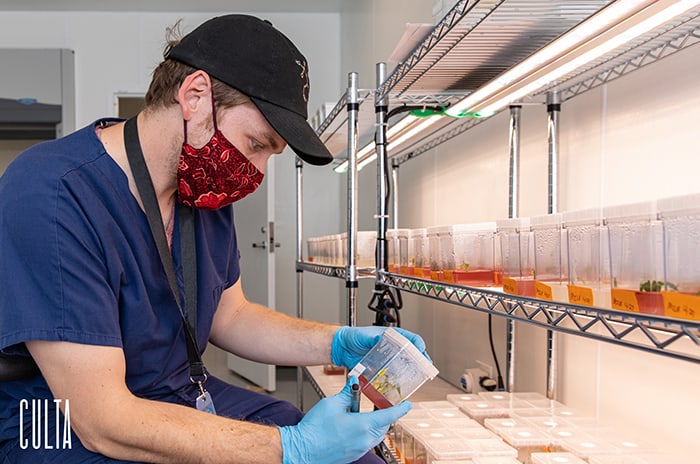
CULTA Launches Maryland’s First Cannabis Tissue Culture Program

Maryland medical cannabis cultivator CULTA has launched the state program’s first tissue culture lab in an effort to further hone its approach to craft cannabis and extracts. Chief Cannabis Officer and co-founder Mackie Barch said that it’s a natural next step in the company’s growth plans and cultivation goals.
The team took their first tissue culture clones on April 8. (The news comes just a few months after CULTA moved its headquarters to a new office in Bethesda to accommodate a long-term growth strategy, which includes plans to add 100 more employees across its farm in Cambridge, retail dispensary in Baltimore and new HQ.)
CULTA’s current collection of 26 cultured strains includes: Dosido 22-22, Poochie Love and Scooby Snacks #2. New mothers are expected in the coming months. The plan is to bank all of CULTA’s genetics in the lab by the end of the year.
The prime motivation was “to ensure redundancy of our genetics, the ability to create clean new moms and to be able to store genetics for long periods of time,” Barch said. “The long-term implications are to ensure we don’t lose prized genetics to disease and age. Additionally, we can store more genetics in a safer manner and bring them back as needed.”
Cannabis strains can be moved in and out of production without a lot of additional cost. This flexibility translates to a greater engagement with sales trends in Maryland.
Looking ahead, the lab will also allow CULTA to develop an in-house breeding program.
“Plant tissue culture is not a hard process to do, but it takes a lot of knowledge and skill to master,” CULTA Tissue Culture Lab Supervisor Isaac Fisher said. “Lab experience is extremely beneficial, especially if it involves microbiology, mycology, botany or biochemistry. No new employees we’re brought on specifically for the Tissue Culture lab. I have past experience working in a molecular genetics lab, but started out at CULTA doing outdoor cultivation and then working in the extraction lab before helping start the tissue culture lab.”






